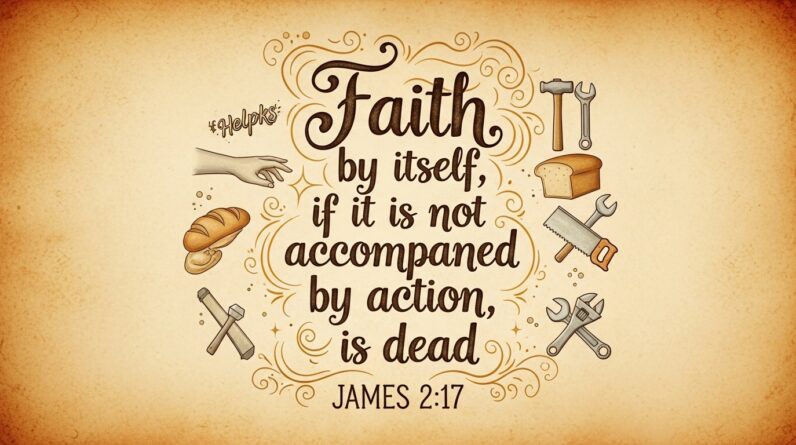The Role Of Forgiveness In Building Strong Relationships
Forgiveness is one of the most powerful choices you will ever make in your relationships. When you forgive, you break chains that hold you and others captive. You model the heart of Christ, yourself freed from bitterness, and you open a door for real healing and restored trust. This article will walk you through why forgiveness matters, the biblical roots of forgiveness, practical steps to let go of grudges, and how to rebuild relationships even after deep hurts. Throughout, you’ll see scripture that supports the work of letting go and moving forward.
Why Forgiveness Matters in Everyday Life
You might think of forgiveness as a nice sentiment, something helpful for the noble-minded. In reality, forgiveness is an essential foundation for relational health. When you refuse to forgive, you allow anger to calcify into a grudge that shapes how you interact with the person who hurt you — and often with everyone else. Bitterness drains your emotional and spiritual energy, clouds your judgment, and stunts intimacy. On the other hand, forgiveness opens the way for honest conversation, reconciliation where possible, and peace, even when restoration is not immediately achievable.
Forgiveness is not the same as excusing harmful behavior or pretending nothing happened. It’s a conscious choice to release the demand for revenge and to let God handle justice and restoration in His timing. This choice creates space for grace to work in your life and relationships.
Forgiveness as a Biblical Mandate
The Bible teaches forgiveness repeatedly because God knows how vital it is for your spiritual growth and relationships. Jesus directly links receiving forgiveness from God to your willingness to forgive others. You can read these words where Jesus says forgiveness is central to how you relate to others: Matthew 6:14-15. This passage challenges you to examine whether you truly want God’s forgiveness while holding on to bitterness.
Jesus also teaches an expansive, unlimited view of forgiveness when Peter asks how many times he should forgive someone: Matthew 18:21-22. You’re told to keep forgiving — not because people always deserve it, but because grace should overflow from a heart that has been forgiven.
How Forgiveness Reflects God’s Character
When you forgive, you reflect the character of God, who is rich in mercy and slow to anger. Paul instructs believers to put away bitterness and anger and to be kind and compassionate to one another: Ephesians 4:31-32. When you offer forgiveness, you are participating in God’s work of reconciliation. You imitate the generous mercy God has shown you.
Jesus gave the greatest example of forgiving love when He prayed for those who nailed Him to the cross: Luke 23:34. If the Son of God can pray for His persecutors, you can begin to take the steps God calls you to take when you’ve been hurt.
Biblical Examples of Forgiveness You Can Learn From
There are vivid stories in Scripture that show how forgiveness looks in real life. Joseph’s life offers one of the most remarkable examples. After being sold into slavery by his brothers and suffering for years, Joseph chose to forgive and to see God’s redemptive hand at work: Genesis 50:20. You can study Joseph’s reunion with his brothers to see how forgiveness involves remembering the harm while intentionally releasing the demand for retribution: Genesis 45:4-8.
The parable of the prodigal son also shows you the heart of a forgiving father who restores a relationship rather than exacting punishment: Luke 15:11-32. The father’s readiness to welcome his son home is a picture of the grace God offers and a template for how you can respond when someone repents.
What Forgiveness Is — and What It Isn’t
It’s crucial to get clarity about forgiveness. Forgiveness is a decision and a process, not a one-time feeling. It is choosing to release the right to hurt the offender or demand repayment. It’s also a commitment to not let the offense define your relationship or your identity.
But forgiveness is not forgetting in the sense of erasing memory, nor is it pretending the offense didn’t matter. It isn’t automatic reconciliation — full restoration may require time, repentance, and transformed behavior. Forgiveness can be extended even when reconciliation must be delayed for safety or biblical boundaries.
The Connection Between Forgiveness and Emotional Health
When you hold onto grudges, your body and soul pay the price. Resentment often shows up as stress, anxiety, sleeplessness, or even physical illness. Scripture invites you to cast your burdens on the Lord and live in freedom rather than captivity. Proverbs shows the wisdom of covering offenses rather than airing them constantly: Proverbs 17:9. When you forgive, you remove the fuel that keeps anger burning and make room for peace and joy to return to your life.
Forgiveness in Relationships: The Foundation of Lasting Love
Forgiveness in relationships is the bedrock of lasting love because every human relationship will face hurt and misunderstanding. Without forgiveness, offenses accumulate like barnacles on a ship’s hull, slowing down the journey and imperiling the voyage. With forgiveness, you regularly clean the hull and restore the ship’s course.
You will find that couples, families, friends, and church members who practice forgiveness habitually are more resilient in crisis. Forgiveness keeps lines of communication open, creates a climate of grace, and encourages vulnerability rather than defensive armor. You can choose to make forgiveness a habit that protects your relationships from the inevitable wear and tear of life.
Practical Steps to Begin Forgiving
Forgiveness rarely happens all at once. It’s a process that involves heart-work and action. Here are practical steps you can take to begin:
- Acknowledge the hurt honestly — name the pain and how it affected you.
- Choose to forgive as an act of the will, even if emotions lag.
- Release the offender from the debt in your heart; refuse to rehearse the grievance.
- Pray for the person who hurt you and ask God to help you love them.
- Seek reconciliation when it’s safe and appropriate; set healthy boundaries if necessary.
As you take these steps, remember that forgiveness doesn’t mean you rush into unsafe situations. Jesus taught about accountability and wise pastoral care; forgiveness and wise boundaries can coexist.

Forgiveness in Relationships: Practical Tools You Can Use
You will need tools to implement forgiveness in daily life. Start with prayer and Scripture. Pray for strength to forgive, and let God’s Word reframe your thinking. Use journaling to pour out anger and then write a decision to forgive. Speak with a trusted friend or pastor who can walk with you through the process. If the offense is severe, consider professional counseling where you can explore trauma and safety in a guided environment.
The Apostle Paul gives practical, community-centered counsel, encouraging believers to live peaceably and not seek revenge: Romans 12:17-21. These verses remind you that your response matters and that vengeance belongs to God.
How to Forgive Repeated Offenses Without Becoming a Doormat
One of the hardest realities is dealing with repeated offenses. Forgiveness doesn’t mean you allow abuse or ongoing harm. You can forgive while still protecting yourself and others. Setting boundaries is biblical and loving. You may need to limit contact, impose consequences, or seek legal protection in severe cases. The goal is not punishment, but safety and an environment where repentance and transformation can take place.
Forgiveness should be paired with accountability and a change plan. If someone truly repents, a process of rebuilding trust can begin. If they don’t, your forgiveness can still free you from the poison of ongoing resentment while you maintain wise distance.
Forgiving Yourself: The First Step to Healthy Relationships
You can’t give to others what you don’t have in yourself. If you’re carrying self-condemnation for failures, misguided decisions, or past sins, you may struggle to offer grace to others. The Bible promises that God forgives and forgets your sins when you repent: Colossians 3:13. Accepting God’s forgiveness for yourself is foundational to extending forgiveness outward.
When you forgive yourself, you repair your self-image and free up emotional bandwidth to love others more deeply. You’ll be less defensive, more transparent, and more likely to admit mistakes — which in turn invites others to be honest and vulnerable with you.
Rebuilding Trust After Forgiveness
Forgiveness can open the door to reconciliation, but trust has to be rebuilt. Trust is earned over time through consistency, transparency, and loving accountability. You will need to see changed behavior and evidence of repentance. A practical plan with small, measurable steps helps both parties see progress and reestablish safety.
Forgiveness and trust rebuilding often involve small, regular acts of reliability: showing up, telling the truth, keeping commitments, and honoring boundaries. Over time, these acts repair the relational fabric that was torn.
The Role of Prayer and the Holy Spirit in Forgiveness
You won’t be able to forgive in your own strength alone. Prayer and the help of the Holy Spirit are essential. Pray for the grace to forgive and for God to change your heart. Ask the Spirit to give you wisdom in how to respond and to show you when to protect and when to restore.
Jesus teaches you to pray even for your enemies and those who persecute you; prayer softens your heart and transforms your affections. As you pray, you invite God to work in the other person’s life as well, sometimes in ways you can’t see immediately.
Forgiveness as a Habit — Practicing It Daily
Make forgiveness a daily discipline. When you start each day with an attitude of grace, you are more likely to notice opportunities to forgive and to extend mercy quickly. A practice of daily confession and prayer keeps you humble and aware of your own need for grace, which naturally makes you more forgiving toward others.
You can create simple habits: pray for people who irritate you, pause before responding in anger, and rehearse God’s kindness toward you. These small disciplines build a forgiving character that strengthens your relationships.
Handling Unanswered Apologies or Unrepentant People
Sometimes you will forgive and never receive an apology. Other times, the person who hurt you will remain unrepentant. Scripture doesn’t leave you helpless in these situations. You’re called to forgive even when the other person hasn’t asked, because forgiveness is primarily about your heart and your obedience to God. At the same time, you’re free to maintain wise distance and to protect yourself and others.
Forgiving an unrepentant person doesn’t mean you reconcile fully. It means you choose to release the desire for revenge and to trust God with the situation. You can continue to pray for them and to seek God’s justice while living in peace.
When to Seek Help: Counseling, Mediation, and the Church
Some wounds are deep and complex. When you’ve been deeply hurt — especially by abuse, betrayal, or trauma — professional help is often the best route. A trained counselor can help you process emotions, establish boundaries, and navigate reconciliation. Sometimes the church can play a mediating role, offering a safe space for restoration and accountability.
The Bible encourages believers to restore the fallen gently but also to seek wise counsel when needed. You don’t have to carry the burden alone.
Forgiveness in Families: A Special Kind of Work
Family relationships are uniquely complicated because of history, expectations, and closeness. Forgiveness in families requires humility, repeated effort, and sometimes generations of healing. The good news is that families can be laboratories of grace — places where prolonged patience and mercy produce deep transformation.
You can begin by initiating honest conversations, asking for forgiveness when you’ve hurt someone, and offering forgiveness when you’ve been hurt. Over time, these practices form a new family culture of grace rather than grievance.
Forgiveness in Marriages: Keeping the Covenant Strong
In marriage, forgiveness is not optional. When two imperfect people covenant to be one, there will be offenses. Forgiveness keeps the covenant stronger than offenses. You’ll need to practice vulnerability, quick apology, and steady forgiveness. Couples who embrace forgiveness build intimacy because they don’t hold offenses as evidence against each other.
If patterns of hurt repeat, get help from a pastor or counselor. Forgiveness alone won’t fix habitual, destructive behavior without repentance and change, but it does keep the path open for healing.
Stories of Real Change — Hope for Your Relationships
Countless testimonies show that forgiveness rebuilds what seemed irreparable. People who have experienced betrayal, addiction, or long-standing family fractures have seen relationships renewed when forgiveness entered the picture. These stories are reminders that God is in the business of redeeming brokenness, and your obedience to forgive positions you to be part of that redemption.
Look to the Bible and the lives of believers who have modeled forgiveness; let their stories inspire you to take the next faithful step in your relationships.
Overcoming Obstacles to Forgiveness
It’s normal to face obstacles: pride, shame, fear, or the desire for revenge. You may worry that forgiving condones wrongdoing, or that reconciliation will lead to being hurt again. Address these concerns honestly. Forgiveness does not condone; it releases you. It may not immediately restore trust, and it doesn’t remove the need for boundaries.
Bring your obstacles to God in prayer and discuss them with trusted friends or counselors. Often, clarity and courage grow as you receive wise input and spiritual support.

Forgiveness and the Church — A Corporate Call to Reconciliation
The church is called to be a forgiving community. The gospel’s power is most visible when a congregation practices grace, extends mercy to the hurting, and disciplines in love. You are part of this body, and the way you forgive contributes to the church’s witness. When a church models biblical forgiveness, it draws others to Christ and offers a powerful testimony to the world.
Practice confession, mutual care, and restorative processes in your local church so forgiveness becomes a hallmark of your community.
Forgiveness in Relationships: A Final Practical Framework
To bring everything together, here is a simple framework to guide you toward forgiveness and healthy relationship repair:
- Recognize the hurt and name it clearly.
- Own your emotions and be honest before God and a trusted friend.
- Decide to forgive as an act of faith and obedience.
- Pray for the person and ask God to change your heart.
- Choose reconciliation when it’s safe and appropriate; set boundaries when necessary.
- Seek help for deep wounds and participate in a community of grace.
This framework gives you practical steps to move from pain to peace and to rebuild trust steadily.
The Long-Term Fruit of Forgiveness
When you commit to forgiveness, you invest in long-term relational fruit: greater peace, deeper intimacy, and a life less dominated by resentment. You’ll become a conduit of God’s grace, and your relationships will reflect God’s reconciling work in the world. Over time, forgiveness changes you — it softens your heart, increases your capacity for compassion, and helps you see people the way God sees them.
Conclusion: Make Forgiveness a Way of Life
Forgiveness in relationships is not merely an occasional act; it’s a way of life that protects your heart and honors God. As you practice forgiveness, you reflect the gospel and build relationships that can weather storms. Remember the scriptural call to forgive one another as the Lord forgave you: Colossians 3:13. You can start today by praying, making a decision to forgive, and taking one small practical step toward releasing a past hurt.
If you feel stuck, reach out for counsel, join a support group, or talk to someone in your church who can walk with you. God is at work in the messy places of life, and your willingness to forgive makes you a participant in His redemptive story.
Explore More
For further reading and encouragement, check out these posts:
👉 7 Bible Verses About Faith in Hard Times
👉 Job’s Faith: What We Can Learn From His Trials
👉 How To Trust God When Everything Falls Apart
👉 Why God Allows Suffering – A Biblical Perspective
👉 Faith Over Fear: How To Stand Strong In Uncertain Seasons
👉 How To Encourage Someone Struggling With Their Faith
👉 5 Prayers for Strength When You’re Feeling Weak

📘 Jesus and the Woman Caught in Adultery – Grace and Mercy Over Judgement
A powerful retelling of John 8:1-11. This book brings to life the depth of forgiveness, mercy, and God’s unwavering love.
👉 Check it now on Amazon
As a ClickBank Affiliate, I earn from qualifying purchases.
Acknowledgment: All Bible verses referenced in this article were accessed via Bible Gateway (or Bible Hub).
“Want to explore more? Check out our latest post on Why Jesus? and discover the life-changing truth of the Gospel!”








